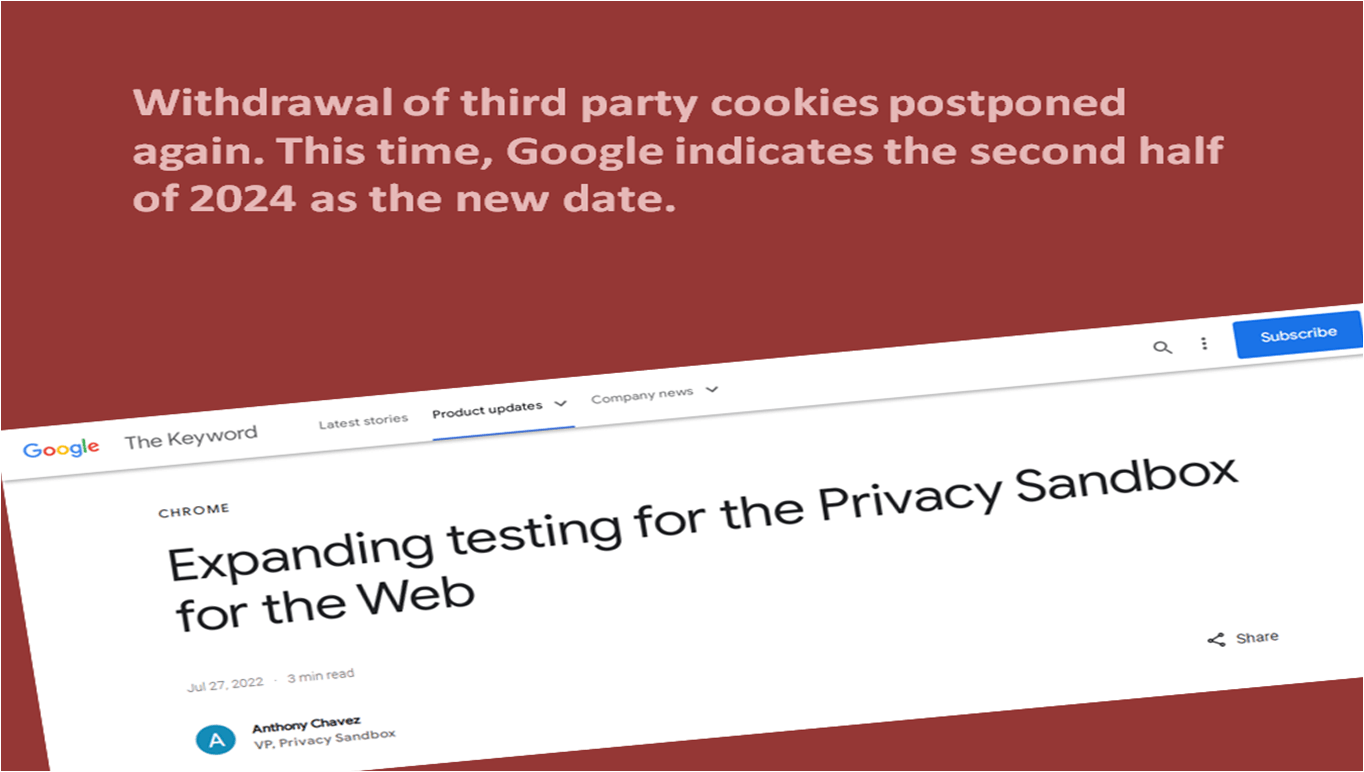Withdrawal of third party cookies postponed again. This time, Google indicates the second half of 2024 as the new date

source: own elaboration
On August 27 this year, Anthony Chavez, vice president of the Privacy Sandbox project, posted on the Google blog The Keyword new post „Expanding testing for the Privacy Sandbox for the Web”, which has one more time postponed the retirement date of third-party cookies from Google. Originally, according to an announcement in January 2020, Google was supposed to block the use of third-party tracking files until the beginning of 2022, but already in June 2021 the deadline was extended to the end of 2023. Then the reason was the need to spend more time refining the Privacy Sandbox, the purpose of which is to protect the interests of both advertisers and other entities of the internet marketing market at the time of the actual withdrawal of cookies.
Another delay to the opt out date of third party cookies
We wrote about the internet giant’s decision to withdraw third-party tracking cookies in Chrome in January this year in the article „Is cookie stuffing a thing of the past?”. However, as it turns out, the dates provided in it are no longer valid. Although the date mentioned in this text (end of 2023) was already the second set by Google, the deadline was moved for another few months - the new one is the second half of 2024.
Why does Google want to withdraw third party cookies?
The reason is very simple - it is about protecting users’ privacy. Cookies work in such a way that the website that owns them, when we enter it, sends a request to our browser to create a cookie. Then our browser creates a cookie on the hard drive or in the memory of our device. This file then collects data about our preferences and internet activity. When we visit a website again, it will receive its cookie along with the information stored therein. As a result, many different companies have large amounts of data about their users and they can share them with their partners or use them for profiling. As the internet giant believes, this in no way serves to protect privacy. The same opinion is shared by other companies that have been looking for an alternative to cookies for several years. These include, among others: Apple and its App Tracking Transparency, i.e. a function that gives control over the collected data to users, The Trade Desk and Unified ID 2.0 Technology. encrypting the data provided during login and creating an identifier from them and the Privacy Sandbox started by Google.
Privacy Sandbox
Advertising is the main source of Google income, so it’s no surprise that the internet giant wants to protect the interests of its customers and partners before deciding to pull third party tracking files out for good. The Privacy Sandbox initiative was launched by Google in August 2019, so before the intention to withdraw third party cookies was announced. Its main goal is to create standards, compliance which would allow obtaining information about users without violating their privacy.
In a nutshell, instead of collecting data on individual people, Google wants to collect information on a whole group of users with similar preferences. Initially, it was supposed to be possible by the use of FLoC - Federated Learning of Cohorts technology, which is a machine learning technique that allows you to group Internet users based on their browsing histories. Thanks to this, the only information about the user that would be provided shell be the group to which the Internet user was assigned, but the advertiser would still receive the data he needs to create appropriate marketing content. However, more and more often it is heard that the FLoC technology for Privacy Sandbox project will be replaced.
Testing continues
Some time ago, trial versions of Privacy Sandbox were made available for developer testing. Earlier this year (2022), Google reached an agreement with the UK’s Competition and Markets Authority (CMA), and as a result, since August, the Internet giant has been gradually extending Privacy Sandbox testing to millions of users of the Google-owned browser. According to Chavez, before a specific person is given the opportunity to try out the sandbox, they are shown a prompt with instructions how they will be able to manage their participation in the study. Privacy Sandbox APIs are expected to be generally available in Chrome by Q3 2023 at the latest.
Timing has changed, but not the reasons
Although the date of implementation of the assumptions from the beginning of 2020 has changed once again, the arguments have remained the same - the reason is still refining the Privacy Sandbox project. According to Google, many entities testing the new solution note that before it becomes a standard, it still needs a lot of time and attention.
„Throughout this process, we’ve worked to refine our design proposals based on input from developers, publishers, marketers, and regulators via forums…” wrote Chavez.„The most consistent feedback we’ve received is the need for more time to evaluate and test the new Privacy Sandbox technologies before deprecating third-party cookies in Chrome”.
This is confirmed by the comments from other companies working on Privacy Sandbox quoted in the post on the Google blog. Masanaga Konishi from Yahoo! JAPAN says the delay is needed to achieve the project’s goal - an advertising ecosystem based on the protection of user rights. Also Masanaga mentions that it will allow more partners to become part of the Policy Sandbox.
Todd Parsons, Chief Product Officer at Criteo, adds that extra time is welcome and will allow to continue testing and building a tool that will ensure mutual success for all online advertising parties.
On the Google blog CEO of IAB Europe -Townsend Feehan and Sandee Parsa, VP, Digital Experience at Adobe also spoke in a similar vein.

